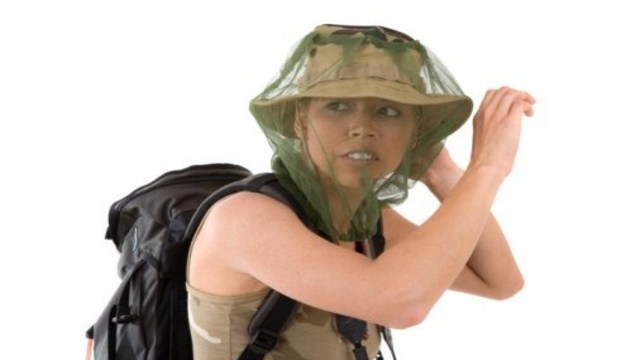 iStockphoto/Thinkstock
iStockphoto/Thinkstock
Every summer, we hear reports about people being infected with the West Nile virus (WNV). This name conjures up images of dirty, pooled water, mosquitoes, painful bites and potentially getting very, very sick. But what exactly is this virus and how do we guard against it?
West Nile virus is a virus carried by mosquitoes and is a threat during the summer months in the United States, which often advances into the autumn season as well. WNV is contracted by humans when they are bitten by infected mosquitoes, which is why summer is the main season for transmission.
WNV can also be transmitted through the handling of dead birds who had the virus.
Unfortunately, mosquitoes are very common around the United States and really gather around wooded areas and water. These are places where people spend a lot of time in the summer, whether camping or gathering at lakes and other typical vacation spots.
And for many Americans, their own front and back yards are a haven for these annoying and often dangerous bugs.
Getting rid of all mosquitoes isn't possible but taking steps to prevent bites is. Mosquitoes are most active at dawn and dusk. Wearing long pants and longer sleeved tops can help eliminate bites but using an effective bug spray is also very important.
Some people do not like the chemical DEET that is used in bug spray but if you do use DEET, taking a shower after coming in can remove these chemicals from the skin. There are other non-DEET options, and a doctor of mine swears by rubbing dryer sheets on the skin!
I have often made the mistake of waiting for the day to cool before watering my flower gardens and have paid a heavy price with the mosquitoes. So I avoid dusk outdoors as much as I can, or I use a spray. Children should also avoid playing outdoors at this time if not covered properly or not wearing a protective spray.
Special outdoor candles containing citronella are off-putting to mosquitoes and we have found that mosquito fogs are also effective. These are small machines filled with a special concoction that is expelled as a mist/fog to repel the bugs, but is harmless to humans.
People should also avoid murky, unmoving bodies of water where mosquitoes are very active.
EmpowHER has written extensively about West Nile Virus, including testing and treatment options.
Aside from talking to the patient about where they have been, use of insect repellant, recent activities and insect bite examinations, tests are available. Such tests include:
- Blood tests
- Lumbar puncture (spinal tap)
- MRI scan of the head
- Electroencephalogram (EEG)
- Electromyography and nerve conduction studies
https://www.empowher.com/media/reference/west-nile-virus
According to the Center for Disease Control and Prevention, about 1 in every 150 people infected with the virus will get extremely sick but most (80 percent) will never know they've contacted WNV. About 20 percent will get mild symptoms.
The CDC states that milder symptoms of WNV include "fever, headache, tiredness, and body aches, occasionally with a skin rash (on the trunk of the body) and swollen lymph glands. While the illness can be as short as a few days, even healthy people have reported being sick for several weeks."
It can take 2-15 days for symptoms to appear.
Severe symptoms include:
"The symptoms of severe disease (also called neuroinvasive disease, such as West Nile encephalitis or meningitis or West Nile poliomyelitis) include headache, high fever, neck stiffness, stupor, disorientation, coma, tremors, convulsions, muscle weakness, and paralysis. It is estimated that approximately 1 in 150 persons infected with the West Nile virus will develop a more severe form of disease. Serious illness can occur in people of any age, however people over age 50 and some immunocompromised persons (for example, transplant patients) are at the highest risk for getting severely ill when infected with WNV."
http://www.cdc.gov/ncidod/dvbid/westnile/qa/symptoms.htm
Anyone with the above symptoms should seek immediate medical help.
For milder cases, rest, plenty of fluids and time are what are needed. With severe cases, hospitalization may be required to make sure no further infections are acquired. Some people will be helped with breathing via machines.
There are no definitive treatments for WNV as yet but some drugs are being tested and researchers are working on a vaccine.
Sources:
EmpowHER.com. Wellness. West Nile Virus. Web. Retrieved June 5th, 2013.
https://www.empowher.com/media/reference/west-nile-virus
Centers for Disease Control and Prevention. Questions and Answers. West Nile Virus Symptoms. Web. Retrieved June 5th, 2013.
http://www.cdc.gov/ncidod/dvbid/westnile/qa/symptoms.htm
Centers for Disease Control and Prevention. West Nile Virus: What You Need To Know. Fact Sheet. Web. Retrieved June 5th, 2013.
http://www.cdc.gov/ncidod/dvbid/westnile/wnv_factsheet.htm
Reviewed June 6, 2013
by Michele Blacksberg RN
Edited by Jody Smith




Add a CommentComments
There are no comments yet. Be the first one and get the conversation started!